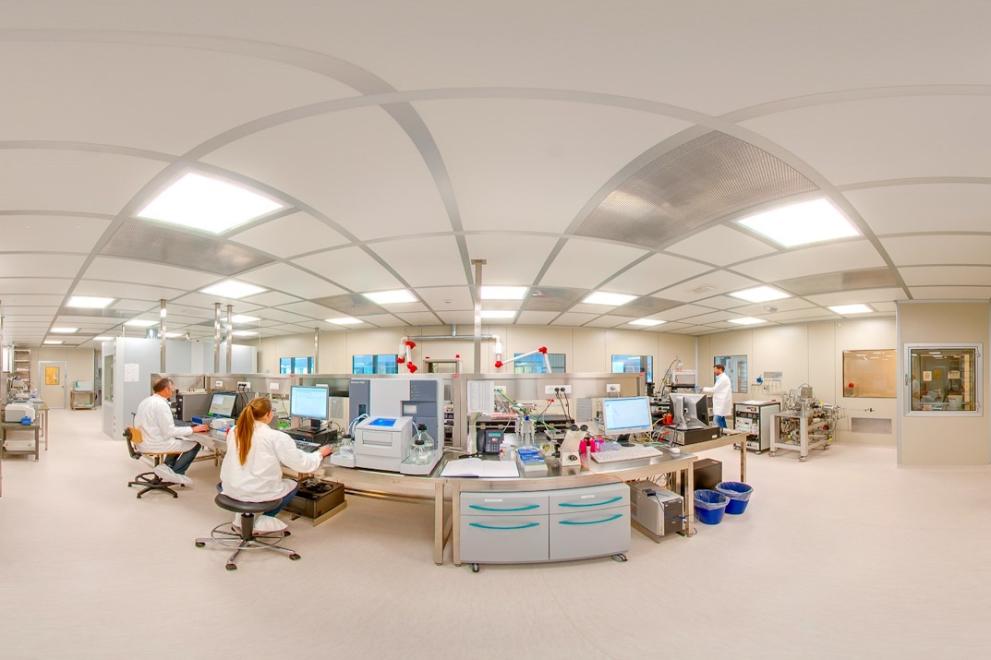Details
- Status
- Closed
- Reference
- 2020-1-TCB-NanoBiotech
- Publication date
- 2 February 2022 in Ispra, Italy
- Opening date
- Deadline model
- Single-stage
- Deadline date
- 16 March 2020, 01:00 (CET)
Description
The Nanobiotechnology Laboratory features state-of-the-art equipped facilities designed to foster interdisciplinary studies. A special emphasis lies on characterisation of nanomaterials, nanotechnology-enabled health products, microplastics, advanced materials and their interactions with biological systems, as well as on the detection, identification and characterisation of nanomaterials and microplastics in complex matrices.

The Nanobiotechnology Laboratory offers the following Training and Capacity Building topics:
-
Hands-on training on nanomaterials sizing using state of the art instrumentations such as Dynamic light scattering, Disk centrifuge sedimentation, Asymmetric Field Flow Fractionation with different detectors, Analytical Ultra-Centrifugation, Tunable Resistive Pulse Sensing and ICP-MS including single particle detection.
-
Introduction into commonly used in vitro assays for studying nanomaterial-cell interactions and highlighting pitfalls occurring during assay development due to the specific nature of nanomaterial (in vitro dosimetry, interaction of nanomaterial with cell reagents).
-
Hands-on training on biomolecular interaction studies using surface plasmon resonance and quartz microbalance techniques.
-
Hands-on Training on Raman spectroscopy, ellipsometry, electron microscopy and an introduction to surface chemistry analysis using XPS and/or ToF-SIMS.
The duration of the training is 5 days. The training will be performed using model samples chosen by the JRC. A half-day session on Nanomaterials in EU regulation will be organised the first day of the training week.
Definition and conditions of access
Access to the research infrastructure is granted on the basis of Access Units (i.e. days of stay of a User at the JRC Research Infrastructure).
Access to JRC Research Infrastructures under the present Framework is free of charge. The costs of travel and subsistence related to the stay of Users at the JRC Research Infrastructure will be fully covered by the JRC.
- Estimated total number of access units allocated to the call: 100
- Average number of access units per project: 25, i.e. 5 Users staying at the JRC Research Infrastructure during 5 days, maximum 3 users per user institution
Intellectual property rights:
In no case the Access shall be treated as granting a licence, assignment or any other form of permission for the Users to use JRC's pre-existing intellectual property without a strict written consent of the JRC
Eligibility criteria
- The Lead User Institution and User Institutions (see definitions in the Framework) must be from a country associated to the EU Research Programme Horizon 2020.
- The Lead User Institution and User Institutions must be from a university, research or public institution, or from a Small-Medium-Enterprise (SME).
- Ethical considerations in accordance with EU Law, in particular Art. 19 of Regulation (EU) 1291/2013, and applicable laws and regulations in the EU Member States.
- The proposal submission form is complete and complies with the instructions.
Travel and subsistence
The JRC will arrange to pay the travel and subsistence eligible costs of the Users directly to a supplier (e.g., to issue the tickets or settle a hotel bill) up to a certain ceiling set out in the call, depending on the number of days spent at the JRC.
For eligible costs that cannot be paid directly by the JRC in accordance with the first paragraph, the JRC will be reimburse to the Users the travel and subsistence costs concerned in accordance with the rules in place at the JRC, up to the ceiling set out in the call.
In both cases, only one return travel ticket will be covered by the JRC for each User for the duration of each project.
Selection criteria
The selection of projects will be made by the JRC with regard to selection criteria grouped in the following two categories:
Quality of the ensemble of User Institutions putting together the proposal:
- CVs of Users
- Number of countries
- Number of User Institutions
- User Institutions with Research Infrastructures complementary or similar to those of the JRC*
Rationale:
- Justification
- Synergies with ongoing research and future plans
- Added value
* User Institutions with Research Infrastructures being planned for upgrading or under construction are also considered.
How to apply
The proposal must be prepared by using Proposal Submission Form.
During preparation of the proposal, applicants are encouraged to:
- Read the Framework of Access to the Joint Research Centre Physical Research Infrastructures for the purposes of Training and Capacity Building for Enlargement and Integration Countries.
- Read the Procedure for the submission and evaluation of proposals for Training and Capacity Building for E&I countries.
- Contact the research infrastructure at JRC-OPEN-NANOBIOTECH
 ec [dot] europa [dot] eu (JRC-OPEN-NANOBIOTECH[at]ec[dot]europa[dot]eu) to assess feasibility aspects in case you request a topic different from the list of Training and Capacity Building topics for the Nanobiotechnology laboratory.
ec [dot] europa [dot] eu (JRC-OPEN-NANOBIOTECH[at]ec[dot]europa[dot]eu) to assess feasibility aspects in case you request a topic different from the list of Training and Capacity Building topics for the Nanobiotechnology laboratory.
The proposal should be submitted to JRC-RI-TRAINING-CB ec [dot] europa [dot] eu (JRC-RI-TRAINING-CB[at]ec[dot]europa[dot]eu) by the closing date of the call (CET time).
ec [dot] europa [dot] eu (JRC-RI-TRAINING-CB[at]ec[dot]europa[dot]eu) by the closing date of the call (CET time).
Communication of the assessment of proposals:2020-04-16 00:00:00
